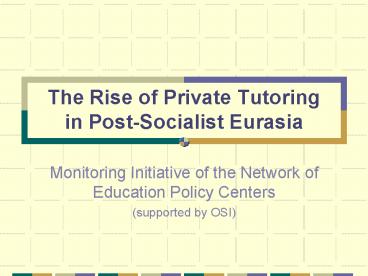The Rise of Private Tutoring in PostSocialist Eurasia - PowerPoint PPT Presentation
1 / 33
Title:
The Rise of Private Tutoring in PostSocialist Eurasia
Description:
Mapped, supported and act in partnership with Open Society Institute ... and which is additional to the provision by mainstream schooling' (Bray, 1999) ... – PowerPoint PPT presentation
Number of Views:96
Avg rating:3.0/5.0
Title: The Rise of Private Tutoring in PostSocialist Eurasia
1
The Rise of Private Tutoring in Post-Socialist
Eurasia
- Monitoring Initiative of the Network of Education
Policy Centers - (supported by OSI)
2
NETWORK OF EDUCATION POLICY CENTERS
- Mapped, supported and act in partnership with
Open Society Institute Education Support Program - 22 countries, 26 centers from CEE, SEE, CA,
Caucasus, CIS
3
MISSION OF POLICY CENTERS
- Emerged in the region in last couple of years
addressing the need for - Independent voice in maturing democracies and
open societies - Advocacy for equal opportunities in education,
accountability, transparent and sustainable
policy decisions - Promotion of participatory policy processes
- Coupling research and policy practice
4
COMMON FEATURES OF EPCS
- Strong local knowledge
- International contacts
- Links with key multinational organizations
- Diverse in nature, organizational structure,
professional background, scope, size, and role in
educational change - Find more about NEPC on the web
http//epc.objectis.net
5
EPC EDUCATION MONITORING INITIATIVES
- Monitoring Private Tutoring
- Monitoring Drop-outs
6
MONITORING OF PRIVATE TUTORING
- Key words equity, transparency, and corruption
- Raising the issue reasons, scope, cost, ethics
- Policy recommendations
- Advocacy and follow-up
7
APPROACH
- Focus on local expertise vs. foreign experts
- Supporting local think-tanks policy NGOs as new
actors in policy processes - Local capacity development
- How to design policy research
- How to write policy papers
- Advocacy skills
8
PARTICIPATING COUNTRIES
- Eastern Europe (Poland, Slovakia, Lithuania)
- South East Europe (BH, Croatia)
- Caucasus (Azerbaijan, Georgia)
- Ukraine
9
DEFINITION
- Private tutoring (PT) refers to the tutoring in
an academic subject which is provided by tutors
for financial gain and which is additional to the
provision by mainstream schooling (Bray, 1999)
10
RESEARCH GOALS
- The scope of PT in the last phase of secondary
education - The context of PT (legal basis, policy decisions
and educational environment) - Impacts of the PT on equity, equal opportunities,
and access issues in education - PT related problems/issues
- Corruption and educational ethics
- Shadow education (hidden costs of public
education)
11
METHODOLOGY
- Theoretical and descriptive analysis of the
phenomenon of private tutoring and its
educational, socio-economical implications - National case studies (qualitative)
- Quantitative survey of 1st year students at
universities (population A) - 8000 students (8 countries)
- Quantitative survey of secondary school students
(population B) - 2000 students (4 countries)
12
CONTEXT The reasons for the rise of PT
- Declining education quality (compensation to
failing education provision) - Economic factors (low teacher salaries)
- Changing examination systems
- Centralized school leaving (Slovakia, Croatia)
- Centralized university admission (Azerbaijan)
- School leaving/university entrance exams
(Lithuania, Poland) - PT as profit making business
- Changing perceptions of PT (prestige, education
value)
13
DIFFERENT FORMS OF PT
- One-on-one private tutoring offered by
individuals - Preparatory courses offered by insitutions
14
PRELIMINARY FINDINGS SCOPE
- PT Preparatory courses
- Azerbaijan 92 6
- Lithuania 75
- Georgia 66 3
- Poland 50 48
- Ukraine 68 38
- Croatia 35 42
- BH
- Slovakia
15
PRIVATE TUTORING IN AZERBAIJANElmina
KazimzadeCIES ConferenceStanford, CAMarch
22-26, 2005
16
KEY REASONS FOR PRIVATE TUTORING
- New, centralized university entrance testing
- introduced as anti-corruption measure in higher
education during in the beginning of 1990s - Gap between school curriculum and university
entrance testing requirements - High demand for higher education degrees as a
guarantee for better employment
17
SCOPE OF PRIVATE TUTORING
18
SCHOOL CURRICULUM UNIVERSITY ENTRANCE EXAMS
- Was school preparation was sufficient to
successfully pass university entrance exams? - Absolutely yes 8
- Probably yes 16
- Dont know 10
- Probably no 29
- Definitely no 36
19
PT INFLUENCE ON SUCCESSFULLY PASSING UNIVERSITY
ENTRANCE EXAMS
- How did PT influence the results of your
university entrance exams? - Absolutely helped 76
- Partially helped 22
- Did not help at all 1
- Cannot answer 2
20
Private Tutoring in Poland
- Elzbieta Putkiewicz
- Institute of Public Affairs
- Warsaw University
21
RESPONDENTS OPINIONS ABOUT PT Four ways of
perceiving private instruction selected (cluster
analysis)
- as a source of additional income for teachers
the cluster is created by the following survey
questions 3, 4, 5, 6, 13 and 14 - as a factor increasing the price of education,
the cluster is created by the following survey
questions 1, 12, 20, 22, 25 and 26 - as a way of preparing for university entrance
exams, the cluster is created by the following
survey questions 2, 15, 16, 23, 24 and 28 - as a way of compensating for school
shortcomings, the cluster is created by the
following survey questions 9, 10, 11, 18, 19 and
21.
22
Location of a secondary school vs. opinions on
PT (Average standardized indices exes and ANOVA
results)
23
Familys financial standing vs. opinions
concerning PT (Average standardised indices and
ANOVA results)
24
Pearsons correlations between parents education
indices vs. aspects dimensions of opinions about
PT
plt0.05, plt0.01
25
Taking and not taking PT vs. opinions concerning
them (Average standardised indexes and ANOVA
results)
26
MONITORING PRIVATE TUTORING IN GEORGIAAnna
MatiashviliNino KutateladzeInternational
Institute for Education Policy, Planning
Management (EPPM)CIES ConferenceStanford,
CAMarch 22-26, 2005
27
CONTEXT OF PRIVATE TUTORING IN GEORGIA
- Key Reasons for Private Tutoring
- Competitive University Entrance Exams
- Poor Quality of Mainstream Schooling
- Economic Circumstances of Mainstream Teachers
28
SCOPE OF PRIVATE TUTORING
29
30
PT DISTRIBUTION ACCORDING TO FAMILY SOCIAL STATUS
31
REASONS FOR PT
32
IMPACT OF PT ON ENTRANCE EXAMS
33
STUDENTS ATTITUDES TOWARDS PT































